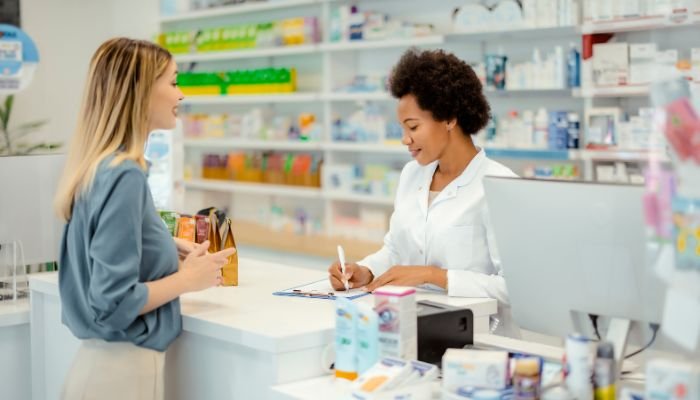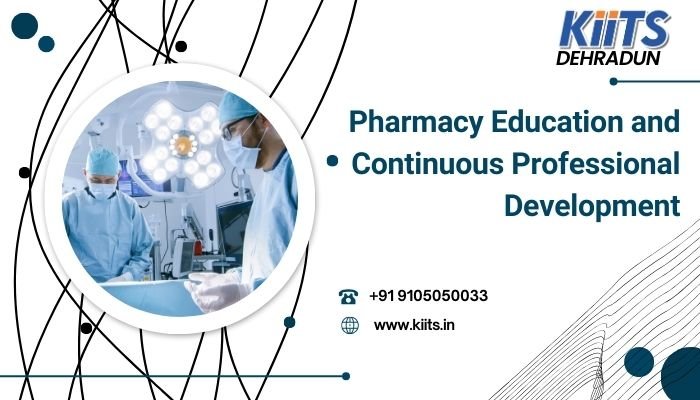Pharmacy is a dynamic and evolving field that plays a crucial role in the healthcare system. As the landscape of healthcare continuously changes, so too must the knowledge and skills of pharmacists. This makes pharmacy education and continuous professional development (CPD) essential components in ensuring that pharmacists remain competent and capable of providing high-quality care. This article delves into the structure of pharmacy education, the importance of CPD, and the various ways pharmacists can engage in lifelong learning.

The Structure of Pharmacy Education:-
Pharmacy education typically begins with a rigorous undergraduate program leading to a Doctor of Pharmacy (PharmD) degree. This program is designed to provide students with a comprehensive foundation in the sciences, as well as practical experience in various aspects of pharmacy practice. The curriculum usually includes courses in pharmacology, medicinal chemistry, pharmaceutics, and therapeutics, among others.
Pre-Pharmacy Requirements
Before entering a PharmD program, students often complete pre-pharmacy coursework, which includes subjects such as biology, chemistry, physics, and mathematics. This foundational knowledge is crucial for understanding the more advanced concepts encountered during pharmacy school.
The PharmD Program
The PharmD program itself typically spans four years and combines classroom instruction with experiential learning. Students gain hands-on experience through internships and rotations in different pharmacy settings, including community pharmacies, hospitals, and clinical environments. This practical training is invaluable, as it allows students to apply their theoretical knowledge to real-world situations, develop clinical skills, and learn how to interact with patients and other healthcare professionals.
Licensure and Certification
Upon completion of the PharmD program, graduates must pass the North American Pharmacist Licensure Examination (NAPLEX) and, in some cases, additional state-specific exams. Licensure is a critical step, as it ensures that pharmacists have met the required standards to practice safely and effectively.
The Importance of Continuous Professional Development (CPD)
Once licensed, pharmacists enter the workforce equipped with the necessary knowledge and skills. However, the field of pharmacy is constantly evolving due to advancements in medical research, technology, and changes in healthcare policies. To remain competent and effective in their roles, pharmacists must engage in CPD throughout their careers.
What is CPD?
Continuous Professional Development is a lifelong learning process that involves the systematic maintenance, improvement, and broadening of knowledge, skills, and competencies. CPD is essential for pharmacists to stay current with the latest developments in their field and to ensure that they can provide the highest standard of care to their patients.
Benefits of CPD
Enhanced Knowledge and Skills: CPD allows pharmacists to deepen their understanding of various aspects of pharmacy practice, including new medications, treatment protocols, and technological advancements. This enhanced knowledge translates to better patient care.
Career Advancement: Engaging in CPD can open up new career opportunities for pharmacists. Specializations, certifications, and advanced degrees can lead to roles in clinical pharmacy, academia, research, and healthcare administration.
Improved Patient Outcomes: By staying informed about the latest evidence-based practices, pharmacists can provide more effective and safe treatments, ultimately leading to improved patient outcomes.
Professional Satisfaction: Continuous learning can lead to greater job satisfaction. Pharmacists who invest in their professional development often find their work more fulfilling and are better equipped to handle the challenges of their profession.
Methods of Engaging in CPD
There are various ways in which pharmacists can engage in CPD, ensuring that they remain knowledgeable and competent throughout their careers.

Continuing Education (CE) Courses
CE courses are structured educational programs designed to provide pharmacists with up-to-date knowledge on specific topics. These courses can be taken online or in-person and often cover a wide range of subjects, including new drug therapies, regulatory changes, and advanced clinical practices. Many professional organizations and educational institutions offer CE courses that are accredited and count towards licensure renewal requirements.
Professional Conferences and Workshops
Attending professional conferences and workshops is another effective way for pharmacists to engage in CPD. These events provide opportunities to learn from experts in the field, participate in hands-on training sessions, and network with peers. Conferences often feature presentations on the latest research, emerging trends, and best practices in pharmacy.
Online Learning Platforms
The advent of online learning platforms has made CPD more accessible than ever. Pharmacists can take advantage of webinars, virtual conferences, and e-learning modules to stay current with the latest developments in their field. These platforms offer the flexibility to learn at one’s own pace and convenience.
Reading Professional Journals and Publications
Staying informed through professional journals and publications is a fundamental aspect of CPD. Journals such as the American Journal of Health-System Pharmacy, Journal of Clinical Pharmacy and Therapeutics, and others publish research articles, reviews, and case studies that provide valuable insights into the latest advancements in pharmacy practice.
Pursuing Advanced Degrees and Certifications
For pharmacists looking to specialize or advance their careers, pursuing additional degrees or certifications is a viable option. Programs such as Master of Science in Pharmacy, Doctor of Philosophy (PhD) in Pharmaceutical Sciences, and board certifications in areas like oncology, infectious diseases, and pharmacotherapy provide in-depth knowledge and specialized skills.
Peer Collaboration and Mentorship
Engaging with peers through professional organizations, study groups, and mentorship programs is an effective way to enhance learning and professional development. Collaborating with colleagues allows pharmacists to share experiences, discuss challenges, and gain new perspectives on their practice.

Challenges and Solutions of(CPD):-
While the importance of CPD is undeniable, pharmacists often face challenges in maintaining their professional development. Common barriers include time constraints, financial costs, and balancing work and personal life. There are some solutions for these challenges:
Time Management: Pharmacists can set aside dedicated time for CPD activities, such as scheduling study sessions, attending webinars during off-hours, or integrating learning into their daily routines.
Financial Support: Many employers recognize the value of CPD and offer financial support for courses, conferences, and certifications. Pharmacists should explore available resources and seek employer-sponsored opportunities.
Leveraging Technology: Online learning platforms and virtual conferences provide flexible and cost-effective options for CPD. Pharmacists can access high-quality education from the comfort of their homes or workplaces.
Professional Organizations: Joining professional organizations can provide access to a wealth of CPD resources, including discounted courses, networking opportunities, and mentorship programs.
Conclusion
Pharmacy education and continuous professional development are vital for ensuring that pharmacists remain competent and capable of providing high-quality care in a rapidly changing healthcare environment. The journey begins with a strong foundation in pharmacy education, followed by a lifelong commitment to learning through CPD. By engaging in various CPD activities, pharmacists can enhance their knowledge, advance their careers, improve patient outcomes, and find greater professional satisfaction. As the field of pharmacy continues to evolve, so too must the dedication of pharmacists to their ongoing education and professional growth.








